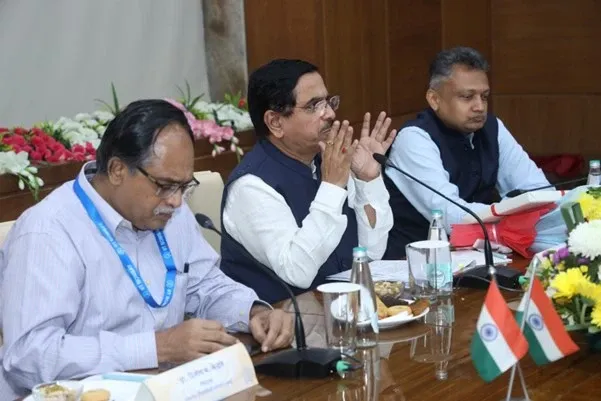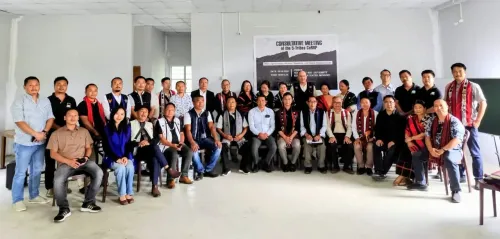Could IIT Bombay's Startup Revolutionize India's Solar Energy?

Synopsis
Key Takeaways
- ART-PV India has developed a tandem solar cell with 29.8% efficiency.
- Government support is crucial in fostering renewable energy innovation.
- NCPRE aims to advance India’s 100 GW solar mission.
- This technology could help India become a global leader in photovoltaics.
- Investment in R&D strengthens India’s energy independence.
Mumbai, July 15 (IAN) The Union Minister for New and Renewable Energy, Pralhad Joshi, announced on Tuesday that the IIT-Bombay-incubated startup, Advanced Renewable Tandem-Photovoltaics India (ART-PV India), has successfully created a 2-Terminal Monolithic Silicon/CdTe-Perovskite tandem solar cell with an impressive conversion efficiency of 29.8 percent. This breakthrough is poised to be a transformative development in India's solar energy landscape.
“This innovative technology is on track to exceed 30 percent efficiency, significantly outperforming traditional solar panels. It positions India as a frontrunner in advanced photovoltaics, and with investments in such innovations, we are lowering solar energy costs, making it accessible to all Indians,” stated the Minister.
“This milestone is a national achievement and represents one of the highest performance benchmarks ever reached in India,” he emphasized.
The Minister visited the National Centre for Photovoltaic Research and Education (NCPRE) at IIT Bombay, engaging in discussions with its Investigators and Advisory Board Members. He toured the Perovskite Tandem solar cell lab, Silicon Fab laboratory, and Medium Voltage Laboratory at NCPRE, interacting with the scientists involved.
NCPRE was established at IIT Bombay in 2010 with backing from the Ministry of New and Renewable Energy (MNRE) of the Government of India. It aims to support R&D and educational initiatives for India’s ambitious 100 GW solar mission. Over the last 15 years, MNRE has allocated more than Rs 200 crore to NCPRE, IIT Bombay.
Additionally, the MNRE is investing $10 million (approximately Rs 83 crore) in ART-PV India to set up a cutting-edge pilot manufacturing facility on the IIT-B campus. This reflects the commitment to fostering domestic Intellectual Property and ensuring that Indian innovations reach global markets. MNRE will sustain its policy and financial support to empower India’s renewable energy sector through innovation and self-reliance, according to Pralhad Joshi.
Joshi remarked, "The Ministry of New and Renewable Energy is proud to endorse NCPRE’s groundbreaking work in high-efficiency, low-cost Silicon-Perovskite Tandem Solar Cells, a pivotal advancement for India’s solar energy future.”
In an era where the world is in search of efficient, affordable, and scalable solar energy solutions, this innovation bestows India with a competitive advantage, he added.
He emphasized that this achievement is not merely lab-based; it serves as a blueprint for clean, scalable, and Aatmanirbhar energy production. India is not just adopting renewable energy but is actively shaping its future through research in perovskite solar cells, inverter technology, PV reliability, green hydrogen, and energy storage, he said.
Joshi affirmed that the MNRE is dedicated to advancing state-of-the-art renewable energy technologies under the Aatmanirbhar Bharat vision, ensuring India takes the lead in clean energy innovation. In this regard, MNRE’s backing of premier institutions like NCPRE, IIT Bombay, enhances domestic R&D, decreases reliance on imported technology, and promotes indigenous manufacturing.
Through initiatives such as the Renewable Energy Research & Technology Development (RE-RTD) and R&D funding schemes, MNRE is empowering institutions like NCPRE to expedite the transition from lab to market, Joshi stated. He added that NCPRE’s endeavors illustrate how publicly funded research, complemented by policy support, can elevate India as a global clean energy hub.
Highlighting MNRE’s strategic support for R&D & commercialization, Joshi encouraged the IIT Bombay-ART PV team to demonstrate that Perovskite Tandem Solar Cells are both scalable and profitable.
“By making advanced technologies available to the industry, we will not only enhance efficiency but also cultivate a stronger innovation ecosystem,” he remarked.
Joshi further noted that this strategy aligns seamlessly with the broader vision of the Central Government, under the leadership of Prime Minister Narendra Modi, to establish Indian R&D as a global benchmark.
He revealed that just two weeks ago, the Union Cabinet approved the Research Development and Innovation (RDI) Scheme, and the budget for Gross Expenditure on Research and Development (GERD) stands at Rs 1.27 lakh crore.
IIT Bombay Director Prof. Shireesh Kedare, NCPRE Principal Investigators (PIs) Prof. Baylon G. Fernandes and Prof. Chetan Singh Solanki, along with ART-PV India Co-Founder Prof. Dinesh Kabra, were present at the event.









